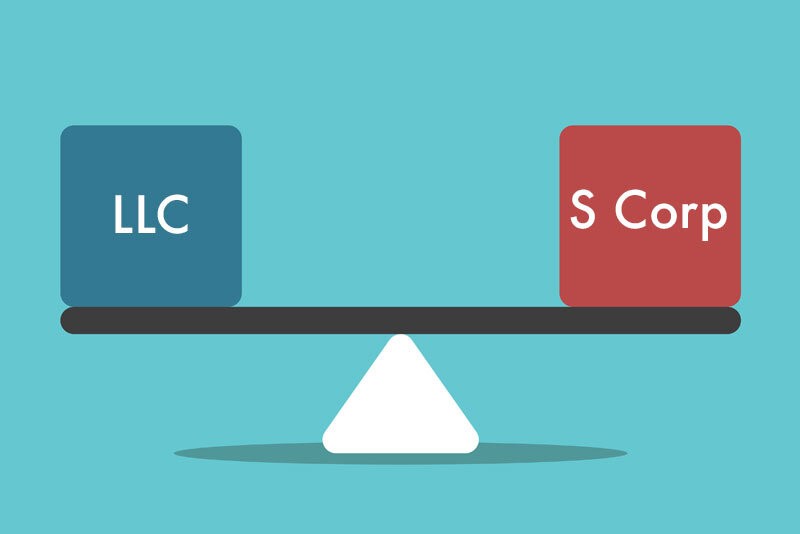When starting a business, choosing the right entity structure is crucial for both operational success and legal protection. Entrepreneurs often find themselves weighing the benefits of forming either a Limited Liability Company (LLC) or an S Corporation. These two popular business structures each offer distinct advantages and limitations. This advantages mostly pertain to taxation, ownership rules, operational flexibility, and liability protection. Below we’ll explain the critical differences between LLCs and S Corporations. This will help you determine which might best suit your business needs.
Definition and Structure
LLCs (Limited Liability Companies) and S Corporations represent two distinct business entity types. Each of them has a unique structural characteristics and operational requirements. People celebrate an LLC for its operational flexibility and straightforward maintenance. It provides limited liability protection where its owners, referred to as members, are not personally liable for business debts. LLCs can have an unlimited number of members. There are also no restrictions on the type of owners. This makes it a versatile choice for many entrepreneurs.
On the other hand, an S Corporation offers similar liability protections. However, it differs significantly in its tax structure and compliance requirements. To qualify as an S Corporation, a business must adhere to stricter eligibility criteria. This includes a limit of 100 shareholders, all of whom must be U.S. citizens or permanent residents. Moreover, S Corporations must follow more formal operational processes. These include holding regular board and shareholder meetings, which adds to their administrative complexity.
To form both LLCs and S Corporations, you must file documents with the state. These are typically articles of organization for an LLC and articles of incorporation for an S Corporation. Each structure also requires the drafting of bylaws or an operating agreement that outlines the business’s governing procedures. Understanding these foundational aspects is crucial for business owners to choose the entity that best suits their operational needs.
Taxation Differences
The tax implications for LLCs and S Corporations are crucial for any business owner to understand. They significantly affect the financial landscape of the enterprise. LLCs typically benefit from pass-through taxation, meaning profits and losses pass directly to members’ personal tax returns, avoiding corporate income tax. Consequently, members report their share of the profits and losses on their individual tax returns, which simplifies the tax filing process.
S Corporations also enjoy pass-through taxation, yet they handle self-employment taxes differently. While LLC members are subject to self-employment taxes on the entire net income of the business, S Corporation shareholders only pay self-employment taxes on salaries they receive, not on distributed dividends. This can result in considerable tax savings for S Corporation shareholders, especially at higher income levels.
Moreover, both LLCs and S Corporations must adhere to specific IRS reporting requirements. LLCs may choose taxation as a sole proprietorship, partnership, or corporation, each option requiring different tax forms. S Corporations, meanwhile, must file an annual tax return on Form 1120S, detailing income, losses, deductions, and credits. Understanding these tax obligations is essential for managing the financial health of LLCs and S Corporations effectively.
Ownership and Investor Attraction
Ownership rules for LLCs and S Corporations significantly influence their attractiveness to investors and their suitability for different business ventures. LLCs offer considerable flexibility in ownership; there are no restrictions on the number or type of members. This allows individuals, corporations, other LLCs, and even foreign entities to own LLCs, making them highly adaptable to various investment needs.
In contrast, S Corporations face stricter ownership constraints. They limit ownership to 100 shareholders, all of whom must be U.S. citizens or permanent residents. Additionally, S Corporations cannot be owned by other corporations, LLCs, partnerships, or non-resident foreign shareholders. This limitation can be a significant drawback for businesses seeking broad investment opportunities, particularly those looking to attract foreign investors or large pools of capital.
Moreover, the investor appeal of LLCs and S Corporations can be affected by their operational and tax structures. While LLCs provide ease and flexibility, which can be very appealing to small, informal, or family-owned businesses, S Corporations often attract investors who prefer a more traditional corporate structure with potential tax benefits, especially concerning self-employment taxes. These differences highlight the need for business owners to carefully consider their target investor base when choosing between LLCs and S Corporations.
Operational Flexibility and Formalities
Operational flexibility significantly differentiates LLCs and S Corporations, impacting their management and administrative requirements. LLCs are known for their operational ease and flexibility, appealing greatly to entrepreneurs who seek a less formal management structure. Unlike S Corporations, LLCs are not required to hold annual board meetings or record minutes, which can streamline operations and reduce paperwork.
In contrast, S Corporations must adhere to stricter corporate formalities similar to those of C Corporations. They are required to conduct regular board and shareholder meetings, keep detailed records of these meetings, and maintain a more structured governance framework. This includes the election of directors and officers who manage the daily operations and strategic direction of the company.
These operational differences can affect the choice between LLCs and S Corporations depending on the business owner’s preference for flexibility versus structure. While LLCs offer a more casual and adaptable operational approach, S Corporations provide a formal structure that might be beneficial for businesses planning to scale or those that require a traditional corporate setup to attract certain types of investors.
Liability and Legal Protection
One of the primary advantages of forming LLCs and S Corporations is the legal protection they offer regarding personal liability. Both entity types provide significant safeguards to their owners’ personal assets, shielding them from business debts and liabilities. This legal separation is crucial for individuals looking to minimize their personal risk while conducting business activities.
For LLCs, the structure ensures that members are not personally liable for business obligations, which means personal assets like homes, cars, and savings remain protected from creditors. This type of protection is often referred to as “charging order protection,” which limits a creditor to the debtor’s distribution share within the LLC.
Similarly, shareholders of S Corporations enjoy limited liability protection. In this arrangement, shareholders are not personally responsible for the company’s debts and liabilities. As a result, only the assets within the corporation can be targeted by legal action or creditors, not those belonging to individual shareholders.
However, it’s important to note that this protection is not absolute. Both LLCs and S Corporations must adhere strictly to corporate formalities to maintain this liability shield. Failure to do so can lead to a “piercing of the corporate veil,” where courts disregard the entity’s separate legal status and hold owners personally liable. Hence, maintaining clear separation between personal and business finances is critical in preserving these protections.
Conclusion
In conclusion, choosing between an LLC and an S Corporation depends largely on your specific business needs, including considerations for tax efficiency, ownership structure, operational flexibility, and liability protection. LLCs offer simplicity and flexibility, making them ideal for startups and small businesses that value ease of management and minimal formalities. On the other hand, S Corporations are suitable for businesses that anticipate growth and prefer a more structured environment, potentially providing tax benefits related to self-employment taxes. Each entity type offers significant legal protections for personal assets, which is a critical factor for any business owner. By carefully assessing the unique attributes and requirements of LLCs and S Corporations, entrepreneurs can select the entity type that not only aligns with their current needs but also supports their long-term business goals. Remember, it’s often advisable to consult with legal and tax professionals to ensure the best fit for your business scenario.



